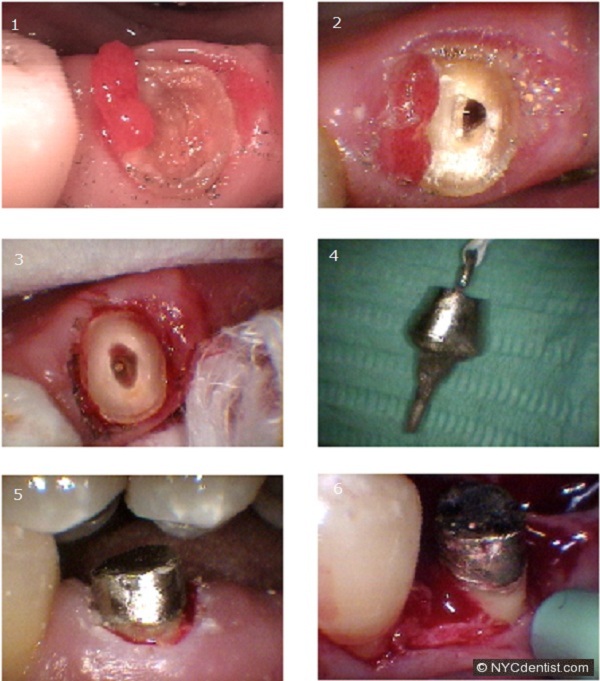How to Treat Tooth Decay Below the Gum.
February 14, 2012 4:34 pmThis patient had a very large cavity underneath an old dental crown. #1 – following crown removal this tooth had decay (cavity) below the gum. Gum inflammation can be seen. The soft tooth structure is the remaining cavity. Photo #2 – an Endodontist then performed root canal. Photo #3 – the root canal was reshaped into an oval to prevent rotation of the cast post & core. A gingivectomy was performed at this time to remove this excess gum tissue before taking an impression for the cast post & core. Photo #4 – the cast post & core with a Kaitlyn Loop with a long piece of dental floss tied and knotted through it. The Kaitlyn Loop will help prevent accidental swallowing of the post & core if it is dropped in the back of the mouth. Photo #5 – the cast post and core is cemented in the tooth. The interocclusal clearance is checked. Photo #6 – a Periodontist then performed crown lengthening periodontal surgery. A marginal incision was made on buccal side and a 4 mm submarginal incision was made on the lingual side. A distal wedge was removed. Interproximal soft tissue was removed and then 1-2 mm of osseus reduction was performed on the mesial, distal, and lingual sides of the tooth. 4-0 chromic gut sutures were next used. A provisional cap was cemented with temporary crown cement and then periodontal packing was placed around the tooth and temp.
Tags: cast post and core, cavity below a dental crown, crown lengthening periodontal surgery, distal wedge, gingival hyperplasia, gum surgery, how to make a cast post and core, Kaitlyn Loop, marginal incision, osseous reduction, osseous resection, prevent post and core rotation, tooth decay below a tooth cap
Categorised in: Dr. Dorfman Says
This post was written by Dr. Jeffrey Dorfman
